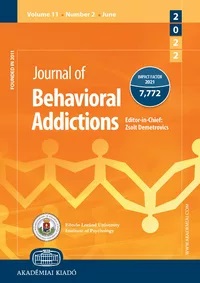Who feels affected by “out of control” sexual behavior? Prevalence and correlates of indicators for ICD-11 Compulsive Sexual Behavior Disorder in the German Health and Sexuality Survey (GeSiD)
Who feels affected by “out of control” sexual behavior? Prevalence and correlates of indicators for ICD-11 Compulsive Sexual Behavior Disorder in the German Health and Sexuality Survey (GeSiD)
Author(s): Peer Briken, Christian Wiessner, Aleksandar Štulhofer, Verena Klein, Johannes Fuss, Geoffrey M. Reed, Arne DekkerSubject(s): Behaviorism
Published by: Akadémiai Kiadó
Keywords: compulsive sexual behavior disorder; German health and sexuality survey (GeSiD); ICD-11; sexual health; sex survey
Summary/Abstract: Background and aims. The purpose of this study was to examine the prevalence and correlates of indicators consistent with Compulsive Sexual Behavior Disorder (CSBD)—defined and operationalized according to the ICD-11 guidelines—in a large (n = 4,633; 50.5% male; 49,5% female) probability-based German national sample. Methods. Participants were asked if they had ever experienced “intense and recurring sexual impulses or sexual urges that I had difficulty controlling and resulted in sexual behavior” over a period of several months. Those who reported this experience were queried about the associated distress. Results. Overall, 4.9% of men [95% CI = 3.9–6.1] and 3.0% of women [95% CI = 2.3–3.9] reported experiences consistent with ICD-11 diagnostic requirements for lifetime diagnosis. In the 12 months preceding the study, 3.2% of men [95% CI = 2.4–4.2] and 1.8% of women [95% CI = 1.2–2.5] reported experiences consistent with CSBD requirements. Compared to controls and participants who reported elements of compulsive sexuality but without accompanying distress, strict religious upbringing was most prevalent in the CSBD group. The CSBD group was more likely to view sexual practices like men having sex with men as unacceptable and to report the belief that pornography has negative impacts on their sex life and life in general. Compared to the other two groups, the CSBD group was significantly more likely to have received psychiatric treatment for depression or another mental health problem during the past 12 months. Discussion and conclusions. The current study provides novel and important insights into the prevalence and characteristics of CSBD in the general population.
Journal: Journal of Behavioral Addictions
- Issue Year: 11/2022
- Issue No: 3
- Page Range: 900-911
- Page Count: 12
- Language: English

